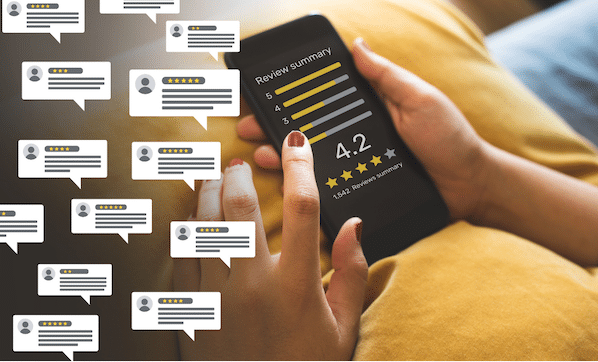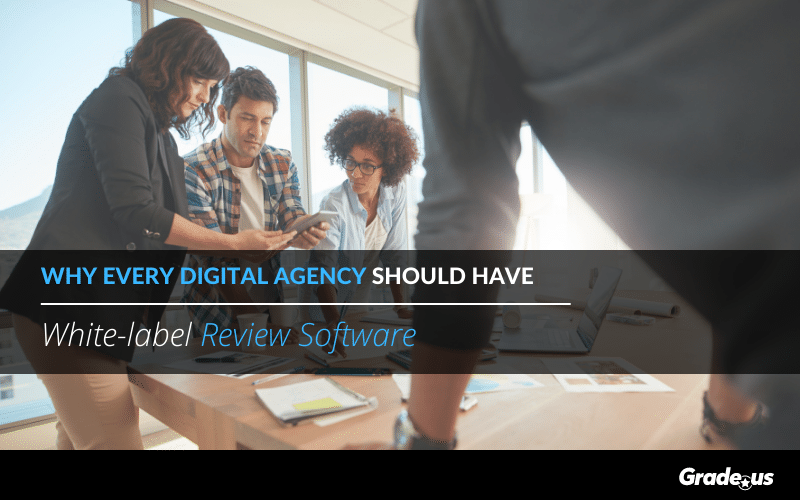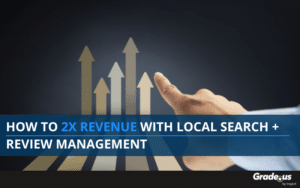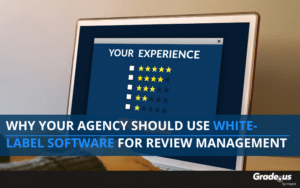According to the Edelman Trust Survey, 56 percent of people believe companies “are trying to mislead them by saying things that are false or gross exaggerations.”
Which is where reviews come in.
A strong review portfolio gives your clients the chance to show the world that they’re trustworthy and capable.
And that’s the problem.
Most agency clients mismanage their review portfolio
It’s not because they’re lazy, inefficient, or incompetent. It’s also not because they don’t care.
It’s a lack of training and a lack of resources.
Your clients are overwhelmed. They’re running from one fire to the next as they try to keep up with the growing list of demands placed on them.
It’s a never-ending battle.
- Small businesses: There’s more work to be done than there are hands to do it. Small business teams are constantly trying to keep up with the growing demand for their products and services. If they’re in demand, they’re overwhelmed. If they’re not, they’re cash-poor.
- Medium businesses: They’re caught in limbo. They’re struggling with small business problems, but they’re also struggling with enterprise headaches. They’re struggling to scale their business, and they’re desperately trying to implement procedures to grow to the next level.
- Enterprise businesses: They’re under constant assault from all sides. They’re under regulatory pressure from the government and watchdog groups. Under pressure from small business disruptors. Their shareholders. Their customers. There’s a significant, never-ending stream of red tape and bureaucracy they’re required to wade through.
This is why reputation management and online reviews are difficult for brands.
Reputation management is your in.
It’s the low-hanging fruit you can use to demonstrate your agency’s value. Reputation management is also the gateway service. It opens doors, enabling you to sell all of your products and services.
What about your clients?
Customers today are sophisticated; they search for high-quality reviews from unbiased customers. They use these reviews to make key buying decisions.
Data from Pew Research shows 82 percent of American adults read customer online reviews before making a purchase. That number climbs to 96 percent for the 18 – 29-year-old bracket and 92 percent for those in the 30 – 49-year-old group.
Is it profitable for your clients?
Let’s look at the data.
- Companies with more than 82 total reviews earn 54 percent more in annual revenue than average
- Companies that respond to even just one review earn 4 percent more than average
- Low ratings on Google and TripAdvisor have the largest negative impact on revenue for small businesses
Reviews are profitable for your clients too.

Why agency clients need a strong online review portfolio
There’s a very good chance your client’s review portfolios are underperforming.
A poor review portfolio could be:
- No reviews
- Too many negative reviews
- Not enough positive reviews
- Too few reviews across multiple review sites (i.e., lots of Avvo and Facebook reviews but no Google reviews)
- Poor reviews from the wrong customer
- Short reviews or reviews with just star ratings
- Reviews that fail to address customer objections
This means agency clients losing a tremendous amount of value in the form of:
- Traffic. If they’re positioned well, reviews are outstanding traffic generators. Why? You’re providing a compelling message in more places. A large segment of these visitors arrive, pre-sold on the value you’re able to provide. This leads naturally to…
- Conversions. Your reviews have pre-sold a large segment of your visitors, so your conversion rates are higher than average. A 2x or 4x boost in conversion is not uncommon. Concrete data back this up, as we’ll see in a moment.
- Leads. When buyers reach out, they’re more serious. They’re interested and impressed by the value you provide. You’re seen as a solid contender. This shifts the balance of power from the buyer to you. You’re able to attract high-quality buyers at a very low per lead cost. This is a huge competitive advantage on its own. It’s difficult for competitors to copy.
- Sales. High-quality leads produce higher quality sales. Buyers are more focused on value. They’re less interested in haggling over price or hammering you for discounts. Why? There’s a significant demand for the value you provide. Good help can be really hard to find.
- Revenue. You’re not reliant on discounts. You don’t have to beg for business. Buyers spend more and stay longer. The Wharton School of Business found the customers you win via word-of-mouth have a 16 to 25 percent higher lifetime value than customers from other sources.
- Profit. The results continue to snowball. Your reviews bring more visitors into your marketing funnel. You’re attracting higher-quality buyers, and you’re spending less money per lead. There’s no need to haggle over price or offer deep discounts, so you make more. It’s a virtuous cycle that floods your business with traffic, customers, and cash.
This isn’t simply speculation.

Northwestern University’s Spiegel Research Center analyzed 57,000 reviews from anonymous consumers and 65,000 reviews from verified buyers of more than 13,500 unique products in diverse categories. Their findings show reviews can increase conversion rates by 270 percent!
Their findings were confirmed more than once.
Wait.
This goes deeper. Remember how I mentioned traffic just a second ago? Research from Moz found businesses risk losing as many as:
- 21.9 percent of customers if you have just one negative aggregate review listed on page one of Google
- 44.1 percent of customers if you have two negative results
- 59.2 percent of customers with 3 negative results
- 69.9 percent of customers with 4 negative results
Remember how I referenced reputation management as a gateway service? This is a prime example of that. Online reviews are an integral part of local search. It’s a no-brainer for clients to reach out for support with their local search, organic search, paid search campaigns, etc.
Why your agency needs white-labeled review management software
It gives you flexibility and profit.
Your agency needs the right delivery model in order to survive. This isn’t simply about online reviews and managing your reputation; this covers all of the other services you offer.
Your delivery model dictates agency growth.
Most agencies follow the retainer/subscription model. They’re focused on producing a significant amount of work in exchange for a set monthly fee. Agencies scale up or down depending on client demands.
This makes sense.
Agencies are forced to hire more staff as they win more clients. When business is good, the agency grows. When clients move on, agencies are forced to cut their workforce.
A feast or famine roller coaster.
Many agencies find this is unsustainable in the long term. It isn’t easy to keep the doors open and the lights on. Suddenly it isn’t easy to retain talented employees. The services you offer, they matter. But, they’re not the most important growth criteria.
That’s your delivery model.
The right delivery model gives your agency a plethora of benefits.
- Steady cash flow. With the right delivery model, your agency receives a consistent stream of cash. This enables you to negotiate from a position of strength.
- Predictability. A consistent delivery model is a predictable one. With the right model, you’ll be able to plan for the future. You have a better idea of when to push for growth, pursue loans or accept investment. When to hire and how many.
- A pricing framework, a tool you can use to increase profitability. You’ll have a better sense of when to raise your prices. You’ll be able to test your pricing safely, consistently boosting agency profits year-over-year.
- Projection accuracy. The right delivery model gives you the ability to make more accurate projections. It’s not a crystal ball by any means, but there’s more predictability than the traditional hourly model most agencies rely on.
If you’re like most agencies, you may assume that you have two delivery options — managed or self-service. In reality, you have more available to you.
Let’s take a look at a few delivery options.
- Managed services: You provide clients with full-service support for their review/reputation campaigns. This option is easy for most agencies to integrate. You can sell managed services with almost any pricing model —subscription, retainer, fixed fee, or hourly.
- Self-service: A do-it-yourself option that empowers clients (especially those with a lower budget) to help themselves. You white-label a provider’s platform then provide new and existing clients access. You can feed this using a different brand for budget clients (e.g., brand A for managed clients, brand B for DIY clients).
- Managed to self-service: This option can be used in a variety of ways. Three common approaches could be. (1.) A managed option that transitions to self-service once the campaign is stable and producing results. (2.) An agency can use the managed option to bring in much-needed revenue and then pivot to self-service once the client roster is mature. (3.) A semi self-service option that gives clients help on an as-needed, infrequent, or low-level basis.
- Self-service to managed: This option can be used in several creative ways. (1.) As an upsell for skeptical clients who are looking for help but prefer to start with self-service so they can better evaluate your performance. (2.) A loss leader agencies use to get their foot in the door with clients. This can be done via a free trial, compelling offer, or bonus. This is a wonderful way to sell managed services to DIY clients. They’re sure they can handle their reputation on their own until they see the amount of time required.
- Managed + self-service. You allow your prospects to self-identify; they’re able to choose the service they want. You’re able to build a large audience and diversify your cash flow. You’re able to use any of the options I’ve suggested above or come up with something new, your choice.
What does this have to do with white-labeled review management software?
Quite a bit.
You’re going to need software to scale your services; there’s no way you can realistically handle all of the nuts and bolts of reputation management on your own.
It’s too much.
What white-labeled review management software does for your agency
White-labeled software accomplishes several agency goals all at the same time.
- Client projects are completed under your agency’s brand
- Clients come to you for help and support, no need to worry about clients abandoning you in favor of cheap software
- You can set your own terms, pricing, and contracts
- You can create your own delivery model(s).
White-labeled software gives you the ability to create a service that’s profitable from day one, whether your agency has a team or it’s just you.
Your software should provide you with flexibility.

For example.
If you’re reselling your services under a branded domain (e.g., “reviewhelper.com”) but have a client who wants to host their landing page on their own domain (e.g., “clientbiz.com/reviews”), Your white-labeled software should enable you to accommodate them without having to change the settings on any of your other client landing pages.
Why is this important?
It allows you to customize your delivery model on a case-by-case basis! This gives you the breathing room you need to identify the delivery model that’s (a.) most profitable for your agency and (b.) best suited to your other services or products.
If you’re offering reputation management services, this is a must.
Is white labeling right for your agency?
Managed White labeling is probably going to be a good fit for your agency if:
- Your pricing is high, but work volume is low
- Your agency is (or will be) a one-stop-shop
- You’re bundling the white label product with your services
- You’re bundling white labeled products with your products
- You have a unique system, process, or strategy you use with the products you’ve white-labeled
- You want your clients to have the ability to self manage their online review management and marketing while you act as a consultant
If you plan on giving your clients more help, service, or support, white labeling (as a managed service) is probably the better choice. When clients need help, they come to you, and they pay for your expertise.
Self-service white-labeling is probably a better fit for your agency if:
- Your pricing is low cost or high volume
- You want to focus on your core business (e.g., paid search), but you want to use review management as a foot-in-the-door service
- You’re looking to sell online review management and marketing services (where you’re doing the management) using a low cost preferred vendor behind the scenes
- You don’t want to give your clients full white-label access
Self-service white-labeling gives you the tools you need to manage your client’s reputation without having to give clients full white-label access. It’s not as transparent as managed services, but it doesn’t have to be if you provide A to Z support.
Reviews show customers your client is trustworthy
A strong review portfolio gives your clients the chance to show the world that they’re efficient, trustworthy, and capable. That’s a problem for most of your clients — they’re in over their heads and don’t even know it.
Clients need your agency.
The majority of your clients are focused on the ins and outs of their business. They’re running from one fire to the next as they try to keep up with the growing list of demands placed on them. White-labeled software gives you the chance to serve your clients at scale, using a delivery model that’s best for your business.
It’s the gateway service.
Use white-labeled review management software to serve your clients. Show prospective customers that they’re the best choice for your clients; clients will treat your agency as the best choice for their business.









